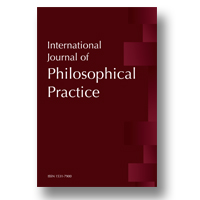|
|
|
1.
|
International Journal of Philosophical Practice:
Volume >
2 >
Issue: 3
Hakam Al-Shawi
The Role of Philosophical Courage in Philosophical Counseling
abstract |
view |
rights & permissions
| cited by
Traditionally we are familiar with at least two forms of courage: physical and moral. But the virtue has other forms which have not been widely recognized. One such form is “psychological courage” required to overcome psychological problems. Another form is “philosophical courage” required for philosophical counseling. In this paper, I argue that whether implicitly or explicitly, both counselor and client need courage, in its form as “philosophical courage,” for successful counseling. Moreover, the degree of such courage in both client and counselor will determine the extent to which issues are brought into question.
|
|
|
|
|
|
|
2.
|
International Journal of Philosophical Practice:
Volume >
2 >
Issue: 3
Kate Mehuron
The Depathologization of Everyday Life:
Implications for Philosophical Counseling
abstract |
view |
rights & permissions
| cited by
Philosophical counseling offers a depathologizing practice that can benefit both the practitioner and the client. Philosopher Michel Foucault’s account of biopower is a useful analytic of the psychopathologization of everyday life, and can show the social significance of philosophical practice. This essay critiques the conflation, by some philosophical practitioners, of the medical disease model and all psychotherapeutic methods. Foucault’s conflation of human normativity and normalization is also critiqued. Historian of science Georges Canguilhem’s alternative account of human normativity within the medical disease model is offered as an antidote to the conflations by these philosophical practitioners and Foucault. Philosophical practitioners ought to give up objectivist claims to value neutrality and acknowledge that the interventions of philosophical counseling in clinical diagnostic discourses are normative, theory-laden, and politically significant.
|
|
|
|
|
|
|
3.
|
International Journal of Philosophical Practice:
Volume >
2 >
Issue: 3
William H. J. Marten
A Theoretical Model of Fragile Authenticity Structure
abstract |
view |
rights & permissions
| cited by
An increasingly number of patients in Western civilizations suffer from weak authenticity structure which is characterized by a lack of self-realization, autonomy, character strength, stereotype behavior, inability to use (internal) dialogue in order to learn about oneself and defining oneself as a individual, and so on. In this paper a theoretical model of fragile authenticity structure and some suggestions to regain a more authentic attitude are presented.
|
|
|
|
|
|
|
4.
|
International Journal of Philosophical Practice:
Volume >
2 >
Issue: 3
Carol Miller
For What are We Born to Become?:
The Logotherapy of Dr. Victor Frankl
abstract |
view |
rights & permissions
| cited by
For what are we born to become as Homo Sapiens? This question is answered in this article on the logotherapy of Dr. Viktor Frankl. This article commences with an exploration of human ontology guided by the philosophy of existentialism. This exploration leads to a continuation of this article by an explanation of logotherapy in theoretical principles and therapeutic processes. This explanation leads to the conclusion of this article by an application of logotherapy in three cases. This article is written with a creative synthesis that engages philosophical thoughts and psychological practices for logotherapists in the 21st Century.
|
|
|
|
|
|
|
5.
|
International Journal of Philosophical Practice:
Volume >
2 >
Issue: 3
Rajshri Jobanputra
The Theory of ‘Selfism’—Man as a Hero
abstract |
view |
rights & permissions
| cited by
Based on my experience as a philosophical counselor for the last two years, in this paper I attempt to describe the perception of life a young mind carries with him when faced with the challenges of life and the typical approaches adopted by him in order to endure them. Subsequent to this I attempt to build the theory of ‘selfism’ explicating the humanistic essence that each individual is not just responsible for the realization of his aspiration but also possesses the power within him to achieve it. This power within an individual is identified by the survival kit he owns consisting of a rational approach to crisis situation, a central purpose vis-à-vis which all daily actions are aligned to and a strong sense of self-worth.
|
|
|
|





